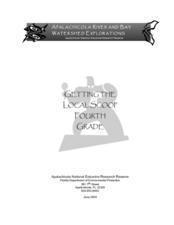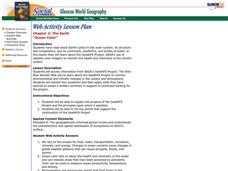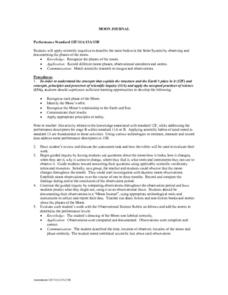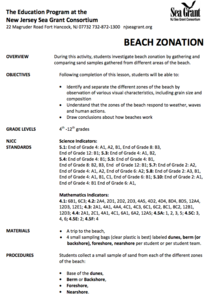Curated OER
Getting the Local Scoop
Fourth graders practice interviewing professionals in their area about their careers at a local watershed. They identify at least three careers that depend on the watershed and discuss its history. They write a composition to end the...
Curated OER
Getting to the Bottom
Young scholars identify taxa in Arctic benthic communities. They discover organisms that live in these Arctic areas. They analyze data compiled for the Canada Basin Benthic Samples, 2002.
Curated OER
Ocean Color
Young scholars examine NASA's SeaWiFS Project Web site to explore how the SeaWiFS Project monitors environmental and climatic changes in the oceans and atmosphere. They answer questions and write a summary in support of continued funding...
Curated OER
What is the Problem of Boston Harbor?
Students recognize the affects of technology on the environment. They examine data to determine methods to improve waater quality. A research paper is written to desribe recommendations for improving water in the future.
Curated OER
Scientific Method Experiment: Factors Affecting How Ice Melts
Students demonstrate the scientific method by conducting an ice cube melting experiment. They make predictions and observations, and conclude what factors make ice melt more slowly or quickly than normal.
Curated OER
Sea Connections: Marine Ecosystems
Students identify producers and consumers from marine ecosystems and describe the balance among them in the environments. After constructing a food chain from a marine ecosystem, they examine human activities that can upset the balance...
Curated OER
Moon Journal
Fourth graders observe Moon and its features, and record results both in written form and in a drawing on the given template.
Curated OER
Weather or Not
Hypothetical meteorologists' quotes help young earth scientists become acclimated to weather vocabulary. The terms are all related to air masses and forms of precipitation. This is a fun way to discover if your learners are truly...
Curated OER
Regolith Formation
Students explain the difference between regolith formation on Earth and the Moon. In this space science instructional activity, students model the different factors affecting regolith formation on Earth. They identify the different types...
Mr. E. Science
Volcanoes
What is the difference between a shield volcano and a cinder cone volcano? How does the flow of lava influence the type of rock that's formed? A presentation on different aspects of volcanoes answers these questions for middle school...
Curated OER
Sentence Completion 19
Help your English language learners deduce meaning from context clues. Eight multiple-choice questions are provided here; each one has five answer options. Example vocabulary words include refused, absent, and original.
Curated OER
Rock of Ages
Students are given a classification table and samples from their location. They locate their samples on the classification table using the characteristics used in rock identification.
Curated OER
Regolith Formation
Students study what regolith is and how it contrasts with weathering on Earth. In this weathering lesson students divide into groups, hypothesize and confirm their guesses.
Curated OER
Beach Zonation
Young scholars investigate the characteristics of the beach environment and explore beach zonation. After gathering samples from different areas of the beach, students discuss how the beaches work and the characteristic of each zone....
Curated OER
Regolith Formation
Students compare and contrast the process of regolith formations. In groups, students define regolith and discover how regolith is formed on the Earth and on the Moon. They participate in experimental activities to simulate regolith.
Curated OER
Chart Interpretation
Students study the use of a nautical chart and how to obtain information from it. They describe and differentiate the basic topographic characteristics of a chart and demonstrate the use of nautical tools used to plot fixed points on a...
Curated OER
Beach Zonation
Students identify and separate the different zones of the beach by observation. They investigate beach zonation by gathering and comparing sand samples gathered from different areas of the beach.


















